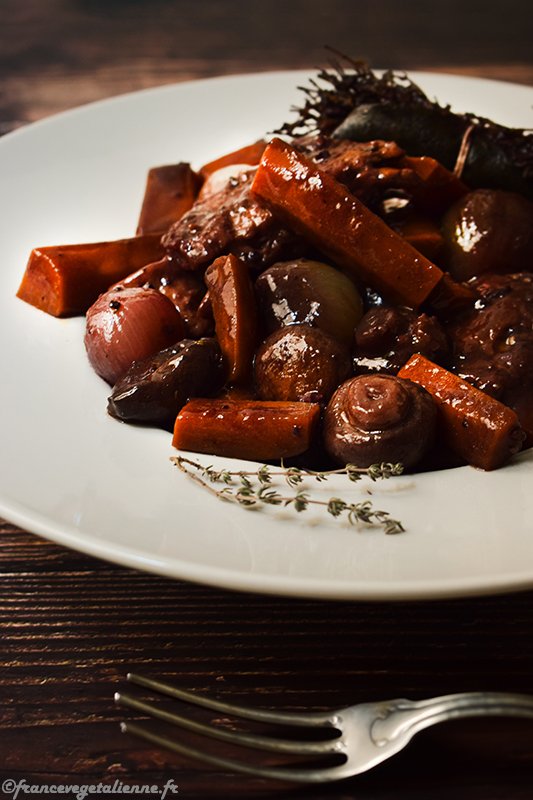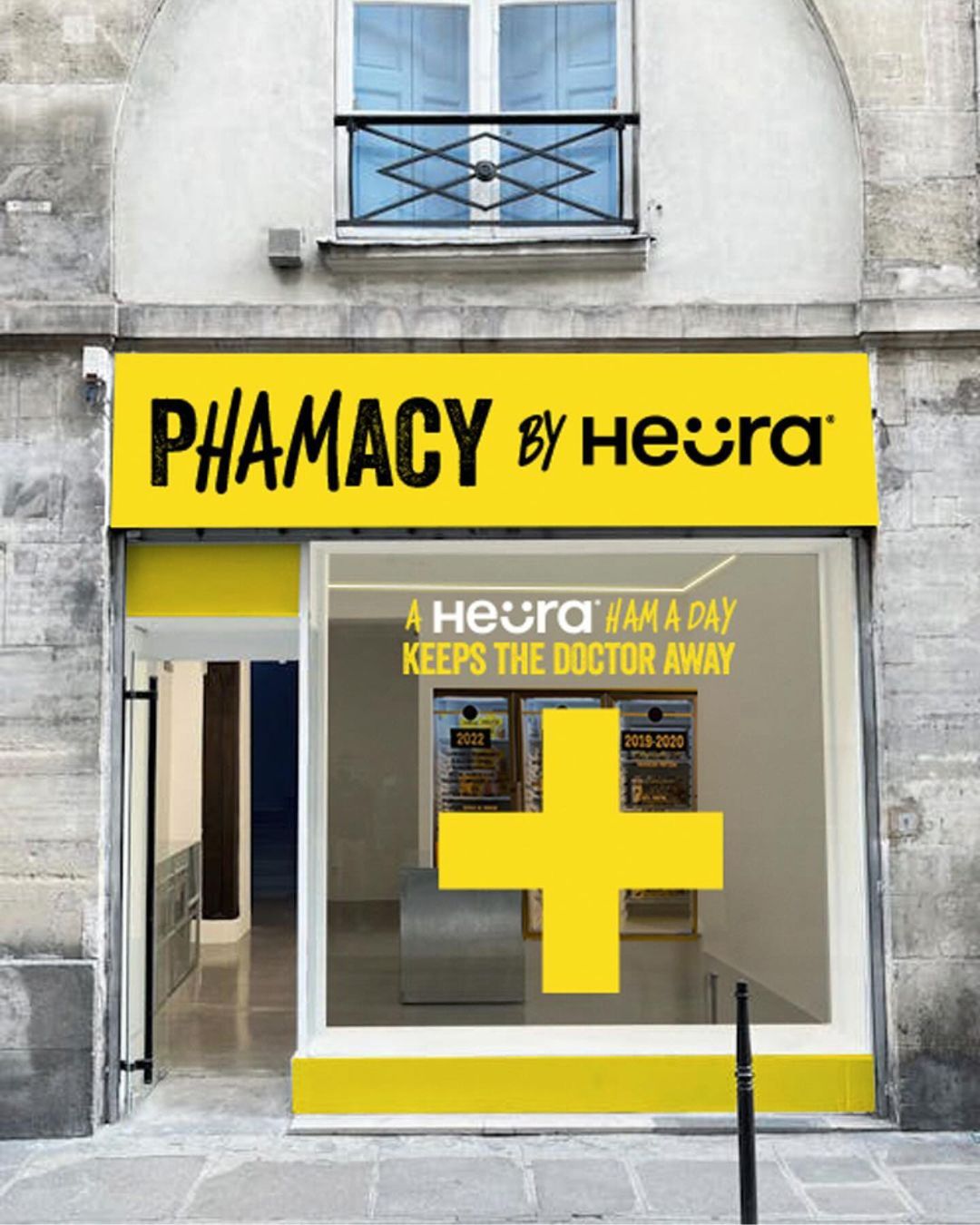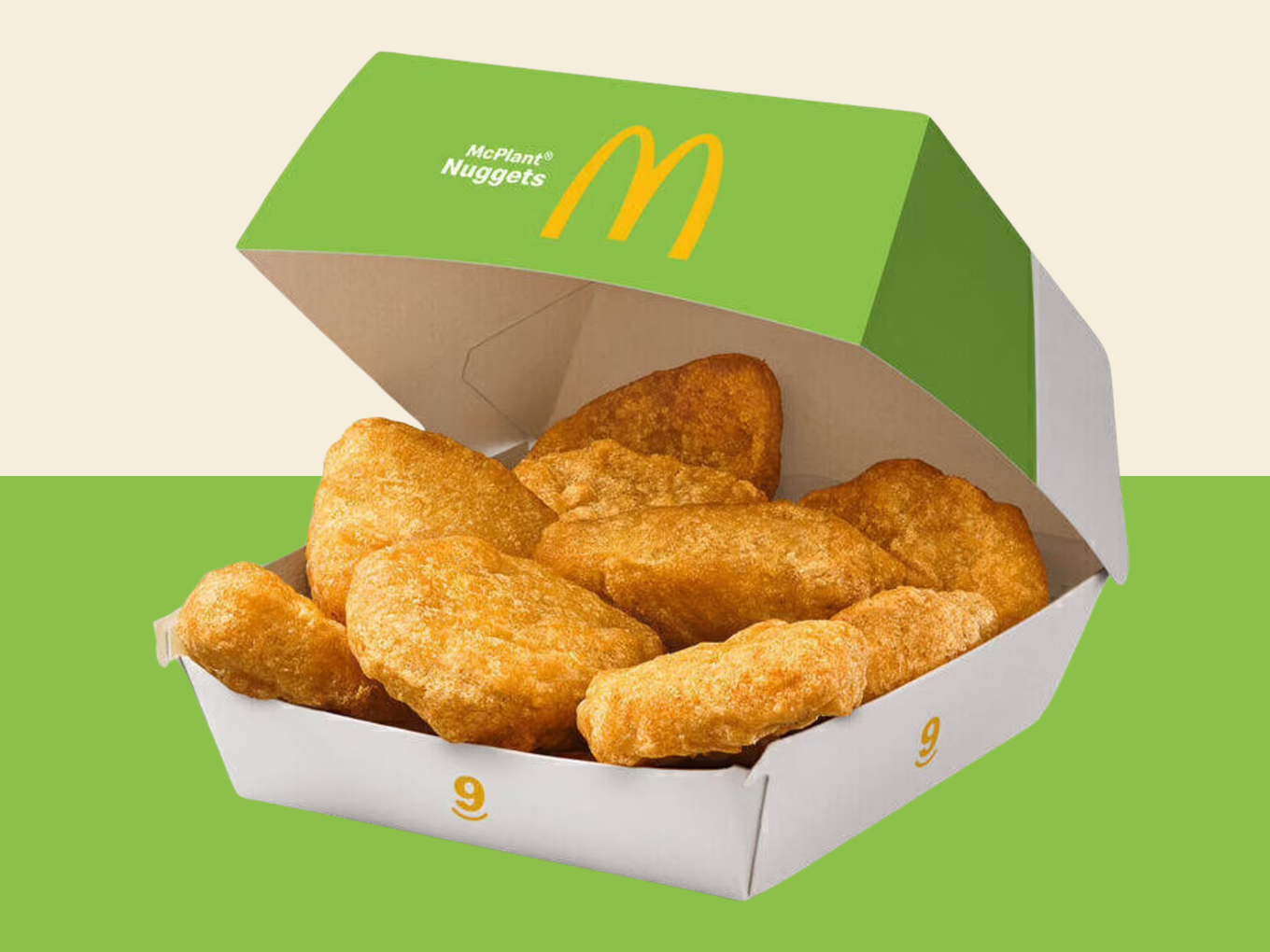“Coq au vin is as synonymous with French culture as hamburgers are with American,” chef and food writer Francois de Melogue once wrote for the recipe website Simple French Cooking. The dish, which is likely centuries years old and features meat slow-cooked in red wine, is hearty, rich, and earthy, and usually enjoyed during the cold French winters. It was once made with rooster, but today, it’s usually made with chicken.
But coq au vin doesn’t actually need to be made with any meat at all. In France Vegetalienne, Parisian food writer Frederic Zegierman, together with Russian recipe developer Lena Korobova, has created a seitan-based version of the traditional dish, which tastes just as delicious when simmered in wine and drizzled with a thick, creamy sauce.
The recipe shows that just like in the US, where many traditional all-American hamburgers are increasingly been made with plant-based beef (the US market for plant-based meat is set to exceed $2.5 billion by 2029), in France—where meat and cheese have long formed the base of most traditional dishes, not just coq au vin—meat doesn’t have to be the default. In fact, the country seems to be embracing plant-based cuisine more than ever.
Demand is rising for plant-based food in France
According to plant-based restaurant guide Happy Cow, France is currently home to more than 4,100 eateries that serve vegan food. In Nice, you can head to Amour Patisserie Vegetale for vegan des cookies chocolat noisette (chocolate hazelnut cookies); in Bordeaux, you can feast on vegan croque monsieur at vegan bar Les Preuves Du Contraire; and in Lille, you can head to Annie’s Kitchen for an egg-free omelette.
 France Vegetaliene
France Vegetaliene
But it’s the city’s famous capital that seems to be embracing plant-based food the most. In Paris, where Happy Cow states there are more than 700 vegan-friendly restaurants, fans and athletes at the 2024 Olympic Games were served a significant number of plant-based options, as the city strived to set a “new standard” for the tournament in terms of sustainability.
Speaking ahead of the Olympics, executive chef for Sodexo! Live Charles Guilloy, who was in charge of running one of the athletes’ restaurants said that the stereotype that French cuisine is nothing but meat is false. “In fact, traditions are built around excellent, local, seasonal vegetables,” he told the Guardian.
“Beef bourguignon is a very French recipe but I’ve reworked it for Olympic athletes as a vegetarian bourguignon with seasonal vegetables, potatoes, carrots, peas, young leeks, and shallots.”
Guilloy isn’t alone in embracing plants. Earlier this year, one survey from ProVeg revealed nearly 50 percent of meat-eaters in France were trying to actively reduce their meat consumption, while nearly 60 percent reported already reducing their annual meat intake. In April 2022, another survey from Beneo GmbH conducted across 10 countries, including France, suggested that one in four consumers are flexitarian.
A plant-based pharmacy, millions of euros for meat-free meatballs, and veggie McNuggets
For most people, health is a big reason why they choose to reduce meat consumption. According to ProVeg, nearly 40 percent of meat consumers in France said their primary motive for cutting down was to do with health.
Processed meats, often used in French charcuterie boards, are associated with a higher risk of several chronic diseases, including heart disease, type 2 diabetes, and cancer. In fact, the World Health Organization has categorized the food as a type 1 carcinogen, which means it is known to cause cancer. Red meats like beef, which, of course, is the main ingredient in dishes like beef bourguignon, are classified as a type 2 carcinogen, which means they likely cause cancer.
Plant-based diets, on the other hand, are linked with a reduced risk of chronic disease. This is because plants are packed with beneficial nutrients, compounds, and antioxidants, which help to reduce inflammation and cholesterol levels and tackle free radical damage in the body. You can read more about the health benefits of plant-based foods here.
In Paris, the Spanish plant-based brand Heura has even opened its own plant-based “phamacy” to help raise awareness of the health benefits of meat-free diets. Instead of medication, it will give away thousands of vegan ham sandwiches.
 Heura
Heura
Announcing the new pop-up on Instagram, the brand wrote: “Studies are clear that consumption of charcuterie can be dangerous for health: cancer, diabetes, heart disease … Yet, most people don’t really know this. So, we want to spread the message in a different way, showing that there is another way to treat yourself while taking care of your health, the planet, and animals: plant-based ham.”
“We are convinced that food should be our first medicine. So, to celebrate, we invite you to come and enjoy our delicious sandwiches and wraps for free in our Parisian pHAMacy.”
The news of the pop-up comes after the plant-based brand toured its own traveling plant-based butcher counter around branches of the French supermarket Leclerc. According to the brand, after Spain, France is home to its biggest customer base.
“As a champion of Mediterranean, healthy, and plant-based cuisine, Heura is proud of the positive impact we have had in France since our arrival three years ago, a testament to the universal appeal of our products,” said the brand’s CEO Marc Coloma in a statement earlier this year.
 McDonald’s
McDonald’s
Heura isn’t alone in experiencing success in France. Statista reports that the plant-based meat market in the country is currently worth more than $155 million, and it’s expected to keep growing. One French brand La Vie, which is based in Paris, recently raised around €25 million for the launch of plant-based meatballs. Until now, the brand has specialized in vegan lardons, ham, and bacon products.
But perhaps one of the biggest signs that plant-based food is taking off in France is in its fast-food chains. The country might be known for haute cuisine, but French people still love to indulge in fast food. In fact, according to Statista, more than half of consumers in France regularly consume fast food.
Right now, you can find La Vie’s vegan bacon in the Veggie Chicken Louisiana Steakhouse Burger in Burger King locations in France, for example. And in McDonald’s, you can choose from a range of veggie burgers, and now, veggie McNuggets, too.
According to the fast-food giant, the move to launch the McNuggets, which are made with meat from California plant-based brand Beyond Meat, comes amid growing demand for plant-based foods in France. “The goal is to meet consumer demand for the variety of proteins on our menu,” said Jean-Guillaume Bertola, the chief marketing officer at McDonald’s France.
He explained that the new nuggets won’t replace the chicken version, but simply offer an alternative. “It’s not about trapping the consumer,” he explained to Le Figaro. “But about offering something other than animal protein and playing on a product that the consumer loves.” He added: “We’re confident about the success of the product.”


